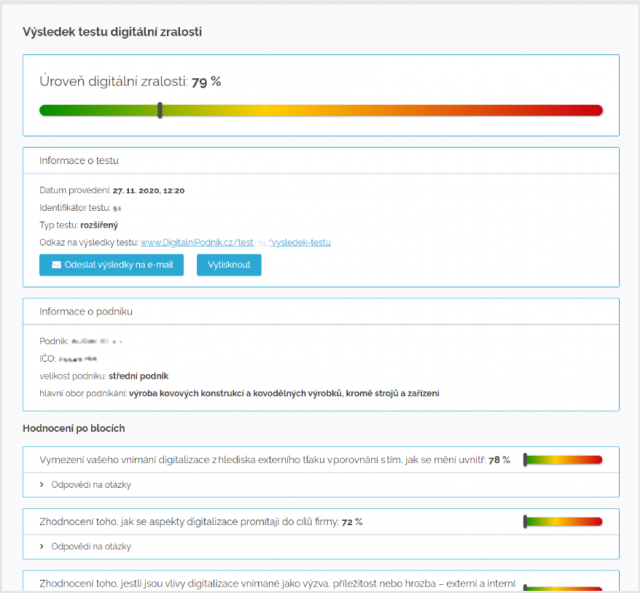Topic
Digitalisation is not a dogma. Scientists form the FBM investigated the readiness of Czech enterprises for digital competition

Small and medium-sized enterprises (SMEs) are among the most important components of the Czech economy. It is important that they are able to keep up with trends and be competitive. Researchers from the FBM (Faculty of Business and Management) BUT (Brno University of Technology) have therefore developed a publicly accessible testing platform digitalnipodnik.cz to get an overview of the state of SMEs in the field of digital innovation and the need for their digital transformation. The platform also enabled a comparison of thousands of Czech enterprises by their level of digital maturity within their industry.
It is no exaggeration to describe digitalisation as the most important phenomenon of the last few decades. New technologies have enabled previously unprecedented business productivity and profitability. It's no coincidence that for many years now, the top rankings of the most valuable global companies have been those linked in some way to digital technology innovation.
How would you describe the situation in the Czech Republic? When looking at the CZECH TOP 100 ranking, energy and industrial enterprises are at the top of the list. That doesn't mean they can't make their business more efficient through digitalisation. However, this is done with hesitation. For example, Eduard Palíšek, CEO of the Czech branch of Siemens and a graduate of doctoral studies at FBP, claims that Czech companies are still largely rely heavily on standard production methods and base their competitiveness on relatively low labour costs.

The project targets small and medium-sized enterprises. According to the European Commission's methodology, these are enterprises with up to 250 employees and an annual turnover of up to €50 million. In the Czech Republic, they form the backbone of the economy, with data showing that theyEurostat employ over 67% of all employees and account for 56% of its GDP. In the context of the competitiveness of the Czech economy, it is therefore crucial how SMEs will approach the opportunities offered by digitalization.
It is good to remember that the priority of enterprises is not digitisation itself, but meeting customer needs and increasing profits. If we want to make a difference in this area, the way forward is not the mindless application of digital technologies, but digital transformation, which is linked to the strategic development of enterprises. Iveta Šimberová, the project's principal investigator from FBM, comments: “Digitalisation is not a dogma. First of all, we have to ask whether the enterprise needs it at all. There are a number of industries where there is no reason to do this, for example if customers require a personal touch.”


The platform itself offers respondents a basic ten-minute test plus an extended one-hour test. Both types of tests allow the SMEs management to obtain data on the level of digital maturity of their enterprise, but in the latter case the result is a more detailed analysis and advice on solution proposals. The understanding of the audit results is simplified by a colour visualisation taken from traffic lights. Shades of green indicate increasing levels of digital maturity, while red indicates areas where digitalisation is insufficient.
The testing helped to map the landscape at a national level and to create a benchmarking of businesses by their level of digital maturity across sectors. Almost 1000 SMEs provided data for the testing. This resulted in 779 fully completed tests, of which 596 were basic tests with an average digital maturity level of 50% and 183 extended tests with an average digital maturity level of 63%. In the basic version of the test, the ICT sector reached the highest level of maturity, while in the extended version the most successful SMEs came from the metal construction and metal products sector. In the test package, enterprises from the ICT, wholesale and engineering manufacturing sectors were the most represented.
The project is also co-directed by University of Technology and Economics in České Budějovice (VSTECB), which was engaged in related research in the field of value chain creation. Using a questionnaire survey, the researchers investigated the impact of SMEs business model innovations on their performance and subsequent customer value creation.
Detailed results of the project, including a technical publication, were presented on 17 May 2023 at a regional seminar in Brno, organised by the Ministry of Industry and Trade of the Czech Republic. This also helps with the promotion of the platform when offering it to SMEs applying for subsidies.
The Czech Technical University in Prague also cooperates with the researchers of this project and the MIT of the Czech Republic, which offers a testing platform DigiAudit. In contrast to the strategic approach of the BUT, it is more focused on Industry 4.0 and verifies the level of related processes in Czech companies.
The researchers managed to complete the project despite the complications caused by the COVID-19 pandemic. The unexpected event had more than just downsides. It has enabled a better understanding of the nature of digitalisation: “Suddenly we were in a situation where we as a company could not make do without digitalisation. Covid has amplified and accelerated a process that was already underway, but we have missed the important part. The unfavourable situation helped us to understand that it is not just about technology, but about monitoring social trends and business ecosystems and setting the overall strategy,” concludes Iveta Šimberová.
(kub)
I forgot twenty years of my life, but I was given a second chance – the graduate of FBM of BUT says after
I still need a driving engine in my life, the former rugby player who today competes in bobsleigh says
Radim Bondy: The current energy crisis is a trial by fire for glass workers
The first woman at the head of the formula team has a great start
She took up sport shooting when she was almost an adult. Today, as a student at the Faculty of Business and Management at BUT, she is a European champion.

